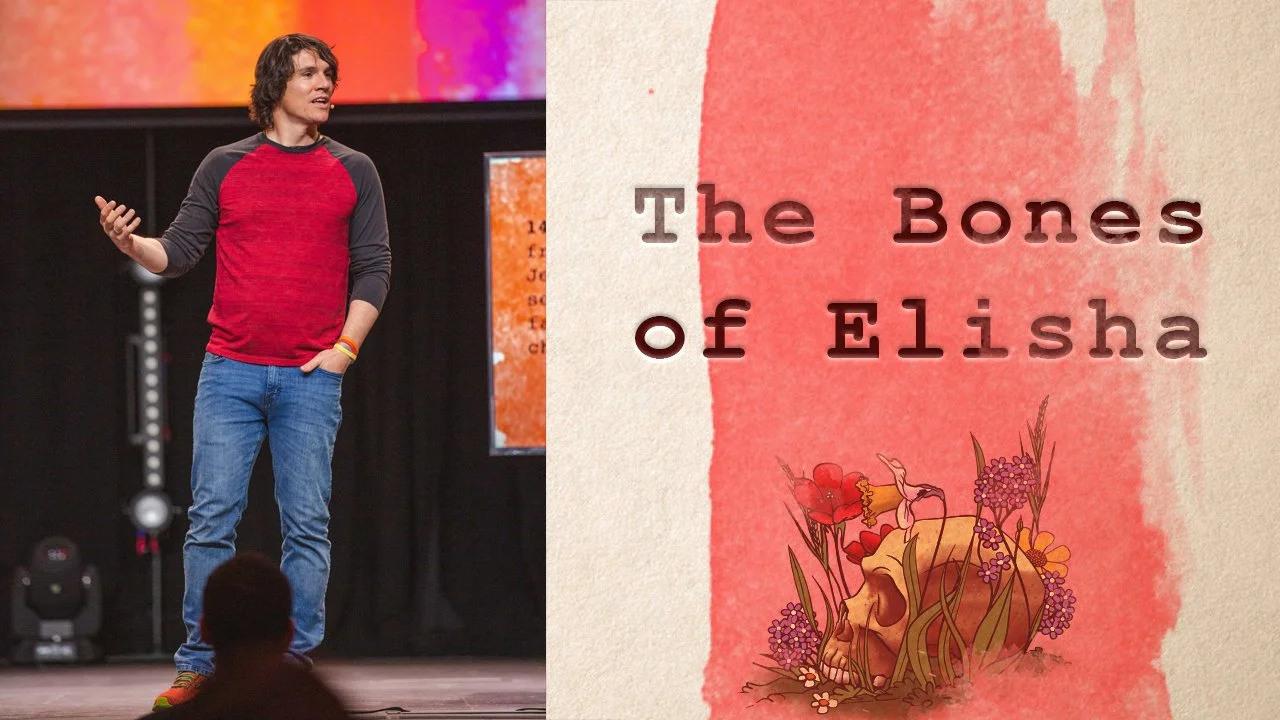Rattle: the bones of elisha
Sermon series based on Rattle, by Elevation Worship
In 2 Kings 2, the prophet Elijah is nearing the end of his life and ministry. He, his student Elisha, and the sons of the prophets each knew that Elijah would soon be carried into heaven by a whirlwind; presumably, there was a prophecy announcing this, though it is not recorded in Scripture. These men are traveling from Gilgal to the Jordan river, and throughout their journey, Elijah repeatedly tests Elisha’s loyalty and commitment to him. When they reach the river, Elijah rolls up his cloak, strikes the water with it, and the two cross over on dry ground, leaving the 50 prophets on the other side. After they cross, Elisha asks for a double portion of God’s anointing on Elijah. “The idea of a double portion was not to ask for twice as much as Elijah had but to ask for the portion that went to the firstborn son, as in Deuteronomy 21:17. Elisha asked for the right to be regarded as the successor of Elijah, as his firstborn son in regard to ministry. Elisha had already been designated as Elijah’s successor (1 Kings 19:19), thus his request is to fulfill the calling he already received.” (Enduring Word Commentary)
Suddenly, “a chariot of fire appeared with horses of fire, and separated the two of them; and Elijah went up by a whirlwind into heaven (2 Kings 2:11), leaving his cloak behind. Elisha picks up the cloak, walks back to the water, strikes it with the cloak, and once again the water parts, mirroring Elijah’s miracle, symbolizing that he has inherited the prophetic ministry of Elijah.
2 Kings 13:15-25 records the events surrounding the death of Elijah. He had been ill for some time, and Joash, the King of Israel has come to pay his respects. Elisha instructs Joash to take a bow and shoot arrows out the window. Joash was concerned that Israel’s true strength was about to depart from this earth; Elisha was using this illustration to show him that the LORD’s deliverance was still present, and all Joash had to do was shoot the arrow in faith. Enduring Word Commentary. Joash did not seize the strategic moment, striking the ground only three times, thus Israel would be victorious over the Syrian army only three times, instead of the many more victories God would provide.
Joash’s token obedience demonstrates a lack of faith. Instead of fully committing and leaning into the promise of victory God—through Elisha’s challenge—was offering, Joash shoots the arrows out of obligation, not total submission. If he truly believed those arrows represented the victory of God, he’d have emptied the quiver and asked for more.
Incomplete faith leads to incomplete victory. Joash’s partial obedience led to partial victory. Scripture tells us Joash was not a worshipper of the false gods; he was a false worshipper of the true God, and a wicked king (2 Kings 13:11). Though he experienced three victories over Aram, he could have had so much more.
When it comes to your faith, it’s imperative to go all in. When we fail to go all in with our faith, we rob ourselves of the victory and blessing of God. True life change happens when we go all in and trust God (Romans 1:16, Philippians 4:6-7). God longs for us surrender all our fears, anxiety, and doubt, on Him. The deeper our surrender, the more we get to experience the power of God in our lives.
2 Kings 13: 20-21 briefly references one of the more unusual miracles in Scripture. “While some Israelites were burying a man, suddenly they saw a band of (Moabite) raiders; so they threw the man’s body into Elisha’s tomb. When the body touched Elisha’s bones, the man came to life and stood up on his feet.” No other explanation or exposition is offered, suggesting that there was no inherent power in the bones of Elisha to raise the dead. Instead, it appears to be a one-off miracle honoring the memory of this great prophet.
Though seemingly out of context, Joash’s failure to go all trusting the power of God in is in direct contrast to the resurrection of the man thrown on the bones of Elisha. The man was dead. Elisha was dead. There was no supernatural power in those dry bones. Yet God chose that barren, hopeless place to demonstrate His own supernatural power, leaving no doubt there is nothing our God cannot do.
There is s distinct difference between our initial surrender to Christ as our Lord and Savior (or conversion), and a lifetime of surrender (or consecration), as we learn to live out the implications of that initial surrender. Share your testimony of how or why you felt compelled to surender to Christ.
In Surrender: The Heart God Controls by Nancy DeMoss Wolgemuth, the author states, “The fully surrendered life is intended to be—and can be—the norm for every one of God’s children.” Do you agree with this statement? From your perspective, is the “fully surrendered life” the “norm” for most of the believers you know? Is it your norm? Why or why not?
Think of a time when you felt led to share the gospel or your testimony with someone. How did you respond? Were you all in, bold in sharing your faith, or did you freeze, afraid of causing offense?
What fears or reservations might people have about going all in and surrendering to to God? What fears have you experienced at one point or another in relation to full surrender?
How does Joash’s failure to go all in demonstrate that resistance is far more costly than surrender? What might we stand to lose by holding out on God?
How are surrender and brokenness similar? How do they differ? Are they mutually dependent or is one dependent on the other? If so, in what way(s)?
The world generally has a negative view toward the idea of surrender, associating it with having to raise a white flag when defeated by an enemy. The world also often sees brokenness as failure and ruin. How does a Christian’s surrender to and brokenness before God differ from the world’s view of these words?
Make a Move:
During this study, God may have brought to mind specific areas in your life that are not fully surrendered to His control. Make a note of these areas in a personal journal. Ask God to help you see these issues through His eyes and ask for His help in surrendering these areas to His control.
Prayer Prompt:
Lord, throughout Scripture You show us the blessing and victory that comes from a life that’s fully surrendered to Your will. Help me to go all in so that others see my life as a living example of Your power. Keep my heart humble so I never forget that everything good in my life has come through your hands. Amen

